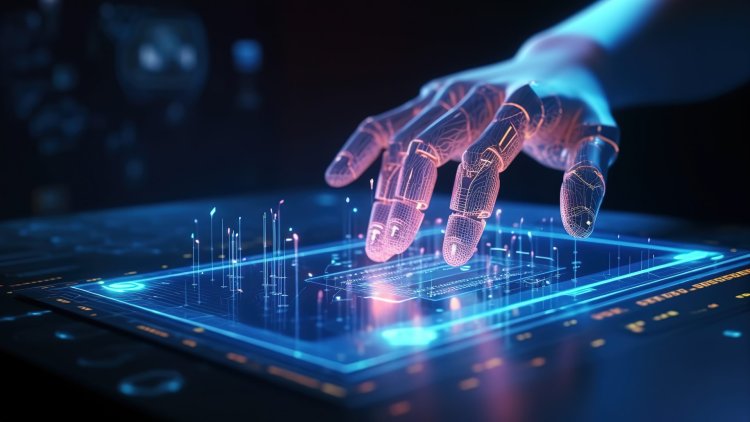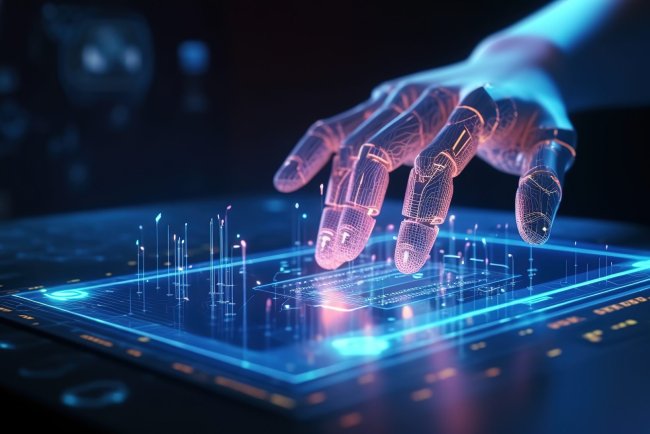Introduction to AI: A Game-Changer in Problem-Solving
Artificial Intelligence (AI) has rapidly emerged as a transformative force across various industries, revolutionizing the way businesses tackle complex problems and make critical decisions.

1. Introduction to AI: A Game-Changer in Problem-Solving
By incorporating advanced algorithms and machine learning capabilities, AI has the potential to enhance efficiency, accuracy, and innovation in problem-solving. From intelligent data analysis to automation and optimization, AI offers a wide range of tools and techniques that can drive significant improvements in business operations and technology advancements. In this article, we will explore the ways in which AI can revolutionize problem-solving in business and technology, uncovering its impact, benefits, challenges, and future outlook.
Understanding Artificial Intelligence
Artificial Intelligence (AI) is like having a super smart sidekick who can analyze vast amounts of data, learn from it, and make decisions. It's not just about robots taking over the world (although that does make for a good sci-fi movie). AI is all around us, from voice assistants like Siri and Alexa to recommendation algorithms on Netflix and Amazon.
The Role of AI in Problem-Solving
AI has the potential to revolutionize problem-solving in business and technology. It can bring efficiency, accuracy, and intelligence to the table in ways that humans alone cannot. By harnessing the power of AI, businesses can automate repetitive tasks, improve accuracy through machine learning, and gain valuable insights from data analysis. So, forget about flipping a coin or relying on gut feelings – AI is here to help us make smarter decisions.
2. Enhanced Efficiency and Accuracy: AI-driven Problem-Solving Solutions
Automating Repetitive Tasks
Let's face it – nobody enjoys doing the same mundane task over and over again. That's where AI comes in to save the day. By automating repetitive tasks, AI frees up valuable time for employees to focus on more high-level, strategic work. From data entry and report generation to customer support responses, AI can handle it all with speed and precision.
Improving Accuracy through Machine Learning
Humans have their limitations – we get tired, we make mistakes, and we have biases. AI, on the other hand, can tirelessly analyze large volumes of data and learn from it. Through machine learning algorithms, AI can continually refine its decision-making process, resulting in improved accuracy over time. So, say farewell to human errors and hello to AI-powered perfection.
3. Intelligent Data Analysis: Leveraging AI for Business Insights and Decision-making
Data Mining and Pattern Recognition
In today's data-driven world, businesses are drowning in a sea of information. But fear not, AI is here to play Sherlock Holmes and help uncover valuable insights. AI-powered data mining algorithms can sift through mountains of data to identify patterns, trends, and correlations that humans might miss. This enables businesses to make informed decisions based on solid evidence rather than mere guesswork.
Predictive Analytics for Business Forecasting
Wouldn't it be amazing if you could predict the future? While AI might not have a crystal ball, it can come pretty close with predictive analytics. By analyzing historical data, AI can forecast future trends, customer behavior, and market conditions. This invaluable information allows businesses to make strategic decisions and stay one step ahead of the competition.
4. Automation and Optimization: Streamlining Business Processes with AI
Optimizing Supply Chain Management
Supply chain management can be a complex web of moving parts. But with AI, businesses can streamline and optimize the entire process, from production to delivery. By analyzing real-time data, AI can identify bottlenecks, optimize inventory levels, and even predict potential disruptions. This not only saves time and money but also ensures that customers receive their products in a timely manner.
Automating Customer Service with Chatbots
Gone are the days of waiting on hold for a customer service representative. Thanks to AI-powered chatbots, businesses can provide instant support to their customers 24/7. These virtual assistants can handle common queries, provide personalized recommendations, and even execute transactions. With chatbots, businesses can deliver exceptional customer service while reducing costs and response time.
AI is not just a buzzword – it has the power to revolutionize problem-solving in business and technology. By leveraging AI's abilities in efficiency, accuracy, data analysis, and automation, businesses can stay ahead of the curve and thrive in a fast-paced, data-driven world. So, embrace the AI revolution and let it be your trusty problem-solving sidekick!
5. Predictive and Prescriptive Analytics: AI in Forecasting and Proactive Decision-Making
Using AI for Predictive Modeling
AI is not just for solving problems that already exist; it can also assist in predicting and preventing future issues. With the power of predictive modeling, AI algorithms can analyze vast amounts of data and identify patterns that humans might miss. By leveraging historical data, AI can provide businesses with accurate forecasts, helping them make informed decisions and prepare for potential challenges.
Utilizing AI for Prescriptive Analytics
Prescriptive analytics takes things a step further by not only predicting outcomes but also providing recommendations on how to optimize those outcomes. With AI-powered prescriptive analytics, businesses can receive actionable insights on the best course of action to take. Whether it's optimizing supply chain logistics, maximizing marketing effectiveness, or fine-tuning customer experiences, AI can guide decision-making and drive proactive problem-solving strategies.
6. AI-powered Problem-Solving in Technology: Transforming Industries and Innovations
AI in Healthcare: Diagnosis and Treatment Assistance
The healthcare industry stands to benefit greatly from AI's problem-solving capabilities. By analyzing patient data and medical literature, AI algorithms can assist in diagnosing illnesses, predicting disease progression, and recommending personalized treatment plans. This not only enhances the accuracy and efficiency of healthcare professionals but also improves patient outcomes and saves lives.
Revolutionizing Manufacturing with AI-driven Automation
Manufacturing processes are being transformed by AI-driven automation. Through the use of machine learning and robotics, AI can optimize production lines, detect anomalies, and even predict maintenance needs. By reducing errors, improving efficiency, and streamlining operations, AI-powered problem-solving is revolutionizing the manufacturing industry, leading to higher productivity and cost savings.
7. Ethical Considerations and Challenges: Implementing AI in Problem-Solving
Addressing Bias and Fairness in AI Algorithms
As AI becomes more integrated into problem-solving, it is crucial to address the issue of bias in AI algorithms. AI systems learn from the data they are trained on, and if the data contains biases, it can lead to unfair outcomes. To ensure fairness, transparency, and inclusivity, companies must invest in diverse and representative datasets, as well as regularly scrutinize and fine-tune their AI models to mitigate bias and promote equal opportunities.
Privacy and Security Concerns in AI Implementation
Implementing AI in problem-solving raises valid concerns about privacy and data security. As AI systems gather and process vast amounts of data, there is a need to protect sensitive information and ensure compliance with privacy regulations. Companies must adopt robust security measures, implement strict data governance policies, and prioritize transparency in how AI operates to build trust and safeguard the privacy of individuals.
8. Future Outlook: Embracing AI for Transforming Problem-Solving in Business and Technology
Emerging Trends and Innovations in AI
The future of AI in problem-solving looks promising, with several emerging trends and innovations on the horizon. These include advancements in natural language processing, computer vision, and reinforcement learning. As AI continues to evolve, businesses can expect improved accuracy, efficiency, and creativity in problem-solving, leading to enhanced decision-making and innovation.
Preparing for the Future of AI-driven Problem-Solving
To harness the full potential of AI-driven problem-solving, businesses and individuals need to prepare for the future. This involves investing in AI talent, fostering a culture of experimentation and learning, and embracing collaboration between humans and machines. By adapting to the changing landscape and embracing AI as a tool for problem-solving, businesses can position themselves for success in an increasingly AI-driven world.
As we conclude this exploration of AI's role in problem-solving within the realms of business and technology, it becomes evident that AI is a powerful tool with the potential to transform industries and drive innovation. Its ability to enhance efficiency, accuracy, and decision-making processes can provide businesses with a competitive edge and unlock new opportunities for growth. However, it is important to address the ethical considerations and challenges associated with AI implementation, ensuring fairness, privacy, and security. By embracing AI and staying at the forefront of emerging trends and innovations, businesses can harness its transformative power to navigate the complexities of problem-solving in the future.
FAQ
1. How can AI enhance efficiency in problem-solving?
AI can enhance efficiency in problem-solving by automating repetitive tasks, analyzing vast amounts of data quickly and accurately, and providing intelligent insights for decision-making. By leveraging AI-driven solutions, businesses can streamline processes, reduce human errors, and optimize resource allocation.
2. What are some ethical considerations when implementing AI in problem-solving?
When implementing AI in problem-solving, ethical considerations include addressing biases in algorithms, ensuring fairness and transparency, protecting user privacy and data security, and maintaining accountability for AI-driven decisions. Striking a balance between technological advancement and ethical responsibility is crucial for harnessing the full potential of AI in problem-solving.
3. Can AI revolutionize problem-solving across all industries?
Yes, AI has the potential to revolutionize problem-solving across various industries. From healthcare and manufacturing to finance and retail, AI-driven solutions can be tailored to specific industry needs and challenges. By leveraging AI technologies and approaches, businesses can drive innovation, improve efficiency, and gain a competitive advantage in their respective industries.
4. What does the future hold for AI-driven problem-solving?
The future of AI-driven problem-solving is promising. As AI continues to evolve and advance, we can expect more sophisticated algorithms, improved automation capabilities, and enhanced decision-making processes. Additionally, AI is likely to play a significant role in emerging technologies such as robotics, Internet of Things (IoT), and augmented reality (AR), opening up new possibilities for problem-solving and innovation.













